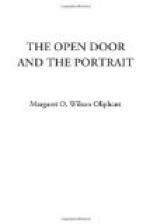Bagley left my service as soon as he got well. He assured me it was no want of respect, but he could not stand “them kind of things;” and the man was so shaken and ghastly that I was glad to give him a present and let him go. For my own part, I made a point of staying out the time—two years—for which I had taken Brentwood; but I did not renew my tenancy. By that time we had settled, and found for ourselves a pleasant home of our own.
I must add, that when the Doctor defies me, I can always bring back gravity to his countenance, and a pause in his railing, when I remind him of the juniper-bush. To me that was a matter of little importance. I could believe I was mistaken. I did not care about it one way or other; but on his mind the effect was different. The miserable voice, the spirit in pain, he could think of as the result of ventriloquism, or reverberation, or—anything you please: an elaborate prolonged hoax, executed somehow by the tramp that had found a lodging in the old tower; but the juniper-bush staggered him. Things have effects so different on the minds of different men.
II
THE PORTRAIT
At the period when the following incidents occurred, I was living with my father at The Grove, a large old house in the immediate neighborhood of a little town. This had been his home for a number of years; and I believe I was born in it. It was a kind of house which, notwithstanding all the red and white architecture known at present by the name of Queen Anne, builders nowadays have forgotten how to build. It was straggling and irregular, with wide passages, wide staircases, broad landings; the rooms large but not very lofty; the arrangements leaving much to be desired, with no economy of space; a house belonging to a period when land was cheap, and, so far as that was concerned, there was no occasion to economize. Though it was so near the town, the clump of trees in which it was environed was a veritable grove. In the grounds in spring the primroses grew as thickly as in the forest. We had a few fields for the cows, and an excellent walled garden. The place is being pulled down at this moment to make room for more streets of mean little houses,—the kind of thing, and not a dull house of faded gentry, which perhaps the neighborhood requires. The house was dull, and so were we, its last inhabitants; and the furniture was faded, even a little dingy,—nothing to brag of. I do not, however, intend to convey a suggestion that we were faded gentry, for that was not the case. My father, indeed, was rich, and had no need to spare any expense in making his life and his house bright if he pleased; but he did not please, and I had not been long enough at home to exercise any special influence of my own. It was the only home I had ever known; but except in my earliest childhood, and in my holidays as a schoolboy, I had in reality known but little of it. My mother had




